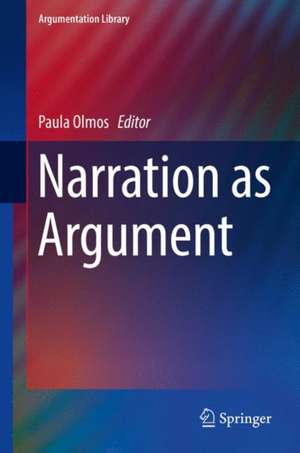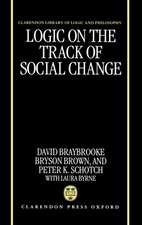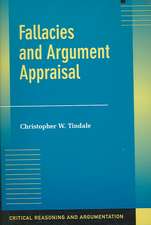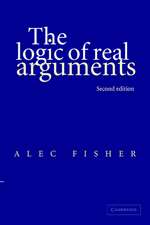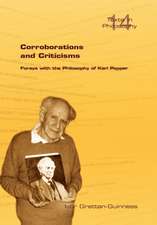Narration as Argument: Argumentation Library, cartea 31
Editat de Paula Olmosen Limba Engleză Hardback – 15 mai 2017
| Toate formatele și edițiile | Preț | Express |
|---|---|---|
| Paperback (1) | 638.11 lei 43-57 zile | |
| Springer International Publishing – 21 iun 2018 | 638.11 lei 43-57 zile | |
| Hardback (1) | 644.30 lei 43-57 zile | |
| Springer International Publishing – 15 mai 2017 | 644.30 lei 43-57 zile |
Din seria Argumentation Library
- 18%
 Preț: 894.03 lei
Preț: 894.03 lei - 18%
 Preț: 1393.40 lei
Preț: 1393.40 lei - 15%
 Preț: 644.63 lei
Preț: 644.63 lei - 15%
 Preț: 644.30 lei
Preț: 644.30 lei - 15%
 Preț: 640.06 lei
Preț: 640.06 lei - 18%
 Preț: 1224.36 lei
Preț: 1224.36 lei - 15%
 Preț: 641.03 lei
Preț: 641.03 lei - 15%
 Preț: 637.78 lei
Preț: 637.78 lei - 15%
 Preț: 636.80 lei
Preț: 636.80 lei - 15%
 Preț: 637.28 lei
Preț: 637.28 lei - 15%
 Preț: 636.30 lei
Preț: 636.30 lei - 15%
 Preț: 643.99 lei
Preț: 643.99 lei - 15%
 Preț: 637.13 lei
Preț: 637.13 lei - 18%
 Preț: 948.47 lei
Preț: 948.47 lei - 15%
 Preț: 643.34 lei
Preț: 643.34 lei -
 Preț: 390.63 lei
Preț: 390.63 lei -
 Preț: 494.70 lei
Preț: 494.70 lei - 20%
 Preț: 572.40 lei
Preț: 572.40 lei -
 Preț: 391.02 lei
Preț: 391.02 lei - 15%
 Preț: 678.35 lei
Preț: 678.35 lei - 15%
 Preț: 647.27 lei
Preț: 647.27 lei - 24%
 Preț: 710.70 lei
Preț: 710.70 lei - 15%
 Preț: 637.46 lei
Preț: 637.46 lei - 24%
 Preț: 829.94 lei
Preț: 829.94 lei - 15%
 Preț: 703.20 lei
Preț: 703.20 lei - 19%
 Preț: 426.51 lei
Preț: 426.51 lei - 18%
 Preț: 735.53 lei
Preț: 735.53 lei
Preț: 644.30 lei
Preț vechi: 758.01 lei
-15% Nou
Puncte Express: 966
Preț estimativ în valută:
123.29€ • 129.05$ • 102.61£
123.29€ • 129.05$ • 102.61£
Carte tipărită la comandă
Livrare economică 31 martie-14 aprilie
Preluare comenzi: 021 569.72.76
Specificații
ISBN-13: 9783319568829
ISBN-10: 3319568825
Pagini: 234
Ilustrații: XII, 234 p. 9 illus.
Dimensiuni: 155 x 235 x 16 mm
Greutate: 0.53 kg
Ediția:1st ed. 2017
Editura: Springer International Publishing
Colecția Springer
Seria Argumentation Library
Locul publicării:Cham, Switzerland
ISBN-10: 3319568825
Pagini: 234
Ilustrații: XII, 234 p. 9 illus.
Dimensiuni: 155 x 235 x 16 mm
Greutate: 0.53 kg
Ediția:1st ed. 2017
Editura: Springer International Publishing
Colecția Springer
Seria Argumentation Library
Locul publicării:Cham, Switzerland
Cuprins
Chapter 1. Introduction: Narratives, Narrating, Narrators; Paula Olmos.- Part I Narratives as Sources of Knowledge and Argument.- Chapter 2. Narratives and the Concept of Argument; Christopher Tindale.- Chapter 3. Arguing with Stories; Floris Bex and Trevor Bench-Capon.- Chapter 4. Narrative Fiction as a Source of Knowledge; Mitchell Green.- Chapter 5. Analogy, Presupposition and Transcendentality in Narrative Argument; Gilbert Plumer.- Chapter 6. Parables: Crossroads Between the Cognitive Theory of Metaphor and Argumentation Theory; Eduardo de Bustos.- Part II Argumentative Narratives in Context.- Chapter 7. Narratives and Pragmatic Arguments: Iven’s The 400 million; Paul van den Hoven.- Chapter 8. The Sample Convention, or, When Fictionalized Narratives. Can Double as Historical Testimony; Leona Toker.- Chapter 9. From Narrative Arguments to Arguments that Narrate; Adrien Frenay and Marion Carel.- Chapter 10. Narrative as Argument in Atul Gawande’s. “OnWashing Hands” and “Letting Go”; James Phelan.- Chapter 11. On Thought Experiments and other Narratives in Scientific Argument; Paula Olmos.- Chapter 12. How to Win Wars: The Role of the War Narrative; Tone Kvernbekk and Ola Bøe-Hansen.
Recenzii
“Narration as Argument is an excellent and informative book that can spur trans-disciplinary conversations with scholars in Black studies, Marxist and feminist theories, literary studies, and media studies, just to name a few.” (Charles Athanasopoulos, Argumentation and Advocacy, Vol. 56 (3), 2020)
Notă biografică
Dr. Paula Olmos has been based as a researcher in Philosophy and Classical Studies in several Spanish academic centres (Universidad Carlos III de Madrid, Universidad Nacional de Educación a Distancia) and is now Lecturer at the Department of Linguistics, Logic and Philosophy of Science (Universidad Autónoma de Madrid). Her research lines include different aspects of the History of Logic, Argumentation and Rhetoric as well as the contemporary Theory of Argumentation, in which she takes a rhetorical stance. She has published papers on these issues in journals like Informal Logic, Theoria, Renaissance Studies, Argumentation or Studies in History and Philosophy of Science, as well as contributions in collective volumes published by Springer, Logos Verlag, ETS (Pisa), Leiden University Press, Cambridge Scholars Publishing, Trotta or Southern Illinois University Press, among others. She is the author of a monographic volume on the Spanish sixteen-century philosopher Pedro Simón Abril (CSIC, 2010), editor of the collections of essays Greek Science in the Long Run (Cambridge Scholars Publishing, 2012), and co-editor, of the collective volumes Compendio de Lógica, Argumentación y Retórica (Trotta, 2011, 22012, 32016), Imaginarios científicos. Conocimiento, narraciones y utopias (Ediciones Clásicas, 2015), De la demostración a la argumentación. Ensayos en honor de Luis Vega (Publicaciones UAM, 2015).
Textul de pe ultima copertă
This book presents reflections on the relationship between narratives and argumentative discourse. It focuses on their functional and structural similarities or dissimilarities, and offers diverse perspectives and conceptual tools for analyzing the narratives’ potential power for justification, explanation and persuasion. Divided into two sections, the first Part, under the title “Narratives as Sources of Knowledge and Argument”, includes five chapters addressing rather general, theoretical and characteristically philosophical issues related to the argumentative analysis and understanding of narratives. We may perceive here how scholars in Argumentation Theory have recently approached certain topics that have a close connection with mainstream discussions in epistemology and the cognitive sciences about the justificatory potential of narratives. The second Part, entitled “Argumentative Narratives in Context”, brings us six more chapters that concentrate on either particular functions played by argumentatively-oriented narratives or particular practices that may benefit from the use of special kinds of narratives. Here the focus is either on the detailed analysis of contextualized examples of narratives with argumentative qualities or on the careful understanding of the particular demands of certain well-defined situated activities, as diverse as scientific theorizing or war policing, that may be satisfied by certain uses of narrative discourse.
Caracteristici
First English book to take a panoramic approach to the argumentative quality of narratives Discusses whether and up to what point narratives may have some argumentative quality or function Brings together academics from Argumentation and Literary Studies, Epistemology, and Philosophy of Language
